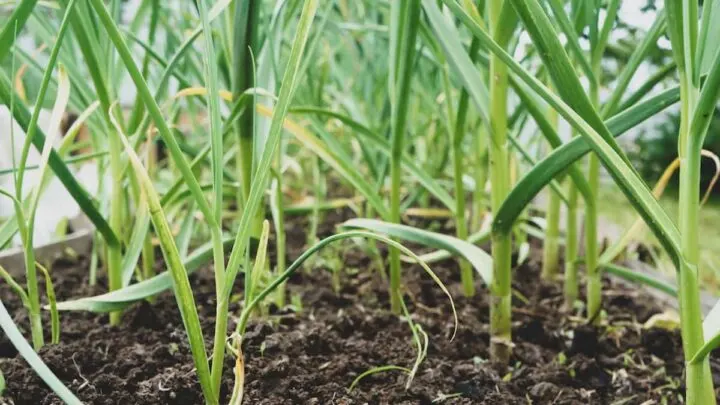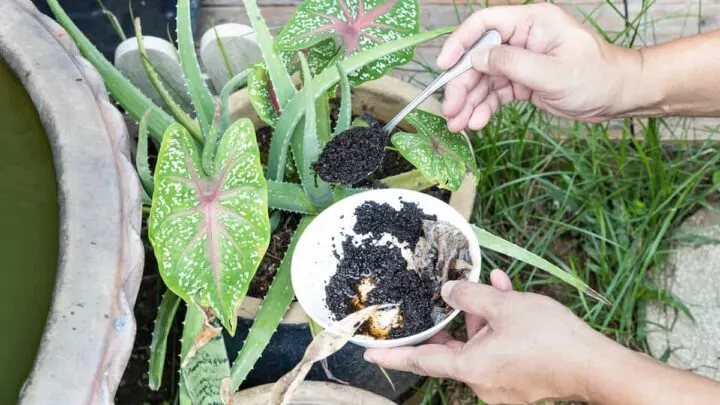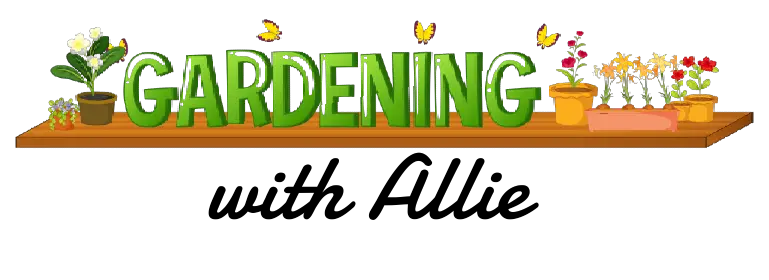Onions are extremely fun and even beneficial thing to grow in your garden. Nothing is better than homegrown onions with a vibrant taste, unlike any store-bought onion. Onions are known for being heavy feeders and love a good compost in their soil to help with their growth. Coffee grounds are a nice natural way to provide those nutrients to plants, but do onion plants like coffee grounds?
Generally, onion plants like coffee grounds. Mixing it into the soil can provide onions with plenty of nitrogen and other nutrients to aid in their growth. Coffee grounds are highly acidic, and only a small amount should be used on onion plants.
In today’s article, we will be talking about onions and coffee grounds. How to properly apply coffee grounds to your compost or soil, what coffee grounds do for soil, and much more! Stay tuned!

What Do Coffee Grounds Do For Soil?
Coffee grounds have been used in soil for decades. People have found that when they add coffee grounds, many of their plants flourish and seem the love the addition. But why? For starters, coffee grounds are high in nitrogen, potassium, and phosphorus.
These three nutrients are the backbones for almost everything growing in the garden. Because of these high levels of nitrogen, potassium, and phosphorus, coffee grounds bring excellent microorganisms to the soil because they feed on these nutrients, just like plants. As the microorganisms feed on the coffee grounds (break them down), the good nutrients are being let out into the soil.
For this reason, onions, heavy feeders, especially nitrogen, love the coffee grounds.
How To Apply Coffee Grounds To Your Soil
There are three very excellent ways to add coffee grounds to your soil. Each way works just the same, and the onions will love it no matter what. Let’s discuss the three different ways.
Overhead Sprinkle
This is great, especially if you have planted and are looking to give your plants an extra boost of slow-releasing nitrogen. Once your plants are planted, take your coffee grounds, and top sprinkle it all over your soil, around your plants. Once it rains, or the next time you water, the grounds will begin to seep into the soil and make their way down, giving the plants a healthy, slow dose of good nutrients.
There is much room for experimentation or free will in the area of how many coffee grounds are needed to be sprinkled on top of the soil. Coffee grounds are not thick, so they cannot be used as mulch. You want to ensure you have an even amount spread over your soil and it hasn’t clumped up in any spots.

Water Solution
Another method of spreading coffee grounds is to hand feed your plants coffee grounds like you give your plants any liquid nutrient feed. This way works faster than sprinkling it without water, as it’s getting directly watered into your plants. So this isn’t a slow-release situation. Watering with coffee grounds is an excellent way to get your plants a faster dose of nutrients.
Experts have claimed that the best way to do this is to use half a pound of coffee grounds for every 5 gallons of water. Pour the grounds into a 5-gallon bucket, fill it with water and mix it completely. This is an important step; you want to ensure the grounds are mixed well in the water. Then pour the water/coffee ground solution carefully into the soil.
Compost Mixture
A common way people use coffee grounds in their gardens is to mix them into their compost. You can do this slowly and whenever you have extra coffee grounds lying around. With this method, you can never have too many coffee grounds in your compost as long as you have plenty of other things to balance everything out, which is the key to good compost.
Caffeine Levels and Soil
Although it is still being researched, there is wide speculation that some plants grow faster when higher levels of caffeine are added to the soil. It is also said that fresh grounds have more caffeine than used grounds, so when using used grounds for your compost or adding to your soil, the caffeine levels don’t matter. Whether or not that is true is up for some debate.

The Problem With Coffee Grounds in Soil
While plants like onions and blueberries, carrots, radishes, etc., do very well with coffee grounds in their soil, other plants cannot thrive in these conditions at all. The thing is, coffee grounds are highly acidic. This means that whatever soil they are being mixed into, they will make the soil highly acidic as well. Plants that don’t do well in acidic soil will have a really hard time growing if there are any coffee grounds in the soil nearby.
You also want to remember that coffee grounds give a lot of nitrogen to your soil, so if you already have soil with a good amount of nitrogen, you may end up burning your plants or stunting their growth if you add more nitrogen.
If appropriately used, coffee grounds make wonderful additions to some soils, giving you a better yield and healthier plants! You have to be careful where you use the coffee grounds and ensure your soil needs it before adding it.
What Else Do Onions Like In Their Soil?
We have talked about how onions like lots of nutrients in their soil. Adding things like kelp, grass clippings, plant matter, manure, peat moss, and fish emulsion are all great things to add to your soil before you plant your onions.
All these things will mix into the soil, creating a whole collection of happy and healthy bacteria that will last the entire time you have your onions in the ground, constantly feeding your onions the best nutrients they need to grow.
Final Thoughts
Coffee grounds are a very common addition to many people’s compost. You can also sprinkle coffee grounds in and around your soil so that they slowly release all of their good nutrients, feeding your plants as they grow.
Use caution when using coffee grounds as an addition to your soil, as certain plants can’t handle the acidity of the coffee grounds. Plants like blueberries, artichoke, asparagus, and onions all do very well in soils with a high pH, making coffee grounds perfect for them. Happy gardening!

Hi there, my name is Allie and welcome to my blog; GareningWithAllie!
Much of what you see written here is just our personal experiences with gardening. Along with the content I write here, there is also a unique collection of gardening topics covered by some of our close friends. I hope you find everything you read here to be helpful, informative, and something that can make your gardening journey the most lovely experience ever! With that said, Happy Gardening!
